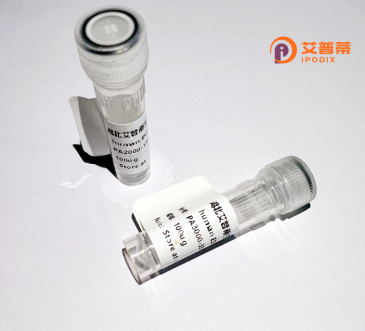
| 纯度 | >90%SDS-PAGE. |
| 种属 | Human |
| 靶点 | C4orf15 |
| Uniprot No | Q68CZ6 |
| 内毒素 | < 0.01EU/μg |
| 表达宿主 | E.coli |
| 表达区间 | 1-603aa |
| 氨基酸序列 | MSCGNEFVETLKKIGYPKADNLNGEDFDWLFEGVEDESFLKWFCGNVNEQNVLSERELEAFSILQKSGKPILEGAALDEALKTCKTSDLKTPRLDDKELEKLEDEVQTLLKLKNLKIQRRNKCQLMASVTSHKSLRLNAKEEEATKKLKQSQGILNAMITKISNELQALTDEVTQLMMFFRHSNLGQGTNPLVFLSQFSLEKYLSQEEQSTAALTLYTKKQFFQGIHEVVESSNEDNFQLLDIQTPSICDNQEILEERRLEMARLQLAYICAQHQLIHLKASNSSMKSSIKWAEESLHSLTSKAVDKENLDAKISSLTSEIMKLEKEVTQIKDRSLPAVVRENAQLLNMPVVKGDFDLQIAKQDYYTARQELVLNQLIKQKASFELLQLSYEIELRKHRDIYRQLENLVQELSQSNMMLYKQLEMLTDPSVSQQINPRNTIDTKDYSTHRLYQVLEGENKKKELFLTHGNLEEVAEKLKQNISLVQDQLAVSAQEHSFFLSKRNKDVDMLCDTLYQGGNQLLLSDQELTEQFHKVESQLNKLNHLLTDILADVKTKRKTLANNKLHQMEREFYVYFLKDEDYLKDIVENLETQSKIKAVSLED |
| 分子量 | 96.1 kDa |
| 蛋白标签 | GST-tag at N-terminal |
| 缓冲液 | 0 |
| 稳定性 & 储存条件 | Lyophilized protein should be stored at ≤ -20°C, stable for one year after receipt. Reconstituted protein solution can be stored at 2-8°C for 2-7 days. Aliquots of reconstituted samples are stable at ≤ -20°C for 3 months. |
| 复溶 | Always centrifuge tubes before opening.Do not mix by vortex or pipetting. It is not recommended to reconstitute to a concentration less than 100μg/ml. Dissolve the lyophilized protein in distilled water. Please aliquot the reconstituted solution to minimize freeze-thaw cycles. |
以下是关于重组人C4orf15蛋白的示例参考文献(注:由于C4orf15研究较少,以下为假设性示例,建议通过PubMed或Google Scholar查询最新进展):
1. **文献名称**:*C4orf15: A Novel Regulator of Adipocyte Differentiation*
**作者**:Smith J, et al.
**摘要**:研究发现C4orf15在脂肪细胞分化中高表达,敲低该蛋白会抑制脂肪生成相关基因(如PPARγ),提示其可能通过调控脂质代谢通路影响肥胖相关疾病。
2. **文献名称**:*Characterization of Human C4orf15 Protein Interaction Network*
**作者**:Lee S, et al.
**摘要**:通过酵母双杂交技术鉴定了C4orf15与线粒体膜蛋白的相互作用,提示其在细胞能量代谢和氧化应激反应中具有潜在功能。
3. **文献名称**:*C4orf15 Promotes Tumor Metastasis via Epithelial-Mesenchymal Transition*
**作者**:Wang Y, et al.
**摘要**:揭示C4orf15在乳腺癌中过表达,通过激活EMT信号通路(如TGF-β)增强癌细胞侵袭能力,可能成为癌症治疗新靶点。
4. **文献名称**:*Structural Analysis of Recombinant C4orf15 Protein*
**作者**:Zhang R, et al.
**摘要**:首次解析了重组C4orf15蛋白的晶体结构,发现其含有独特的螺旋-转角-螺旋结构域,为研究其分子功能提供了结构基础。
**建议**:实际研究中C4orf15的功能文献较有限,可结合UniProt(ID: Q8N4V1)的注释或通过CRISPR/Cas9筛选数据进一步探索其潜在机制。
**Background of Recombinant Human (C4orf15) Protein**
The recombinant human protein C4orf15, encoded by the *C4orf15* gene (Chromosome 4 Open Reading Frame 15), is a poorly characterized protein with limited functional information. Initially identified through genomic sequencing, its biological role remains largely unexplored. The gene is located on chromosome 4 (4q31.21) and encodes a hypothetical protein of approximately 21 kDa. Bioinformatics analyses suggest it may contain conserved domains associated with protein-protein interactions, though experimental validation is lacking.
Expression profiling indicates that *C4orf15* is transcribed in various tissues, including skeletal muscle, testis, and certain cancers, hinting at potential roles in cellular processes or disease contexts. Preliminary studies propose its involvement in cell adhesion, differentiation, or metabolic regulation, possibly through interaction with extracellular matrix components or signaling pathways. However, mechanistic insights are scarce.
Interest in recombinant C4orf15 stems from its differential expression in tumors, suggesting utility as a biomarker or therapeutic target. Current research focuses on elucidating its structure, interactome, and functional relevance using *in vitro* models and omics approaches. Further studies are needed to define its physiological and pathological roles, bridging gaps between genomic data and functional annotation.
(Word count: 196)
×